
Advancements of Microbiology
Scope & Guideline
Connecting Researchers to Microbial Innovations
Introduction
Aims and Scopes
- Microbial Pathogenesis and Infections:
Research focusing on the mechanisms through which microorganisms cause diseases, including studies on specific pathogens, virulence factors, and host interactions. - Microbiome Studies:
Investigations into the human microbiome, including its role in health and disease, effects on fertility, and implications for treatment and prevention of various conditions. - Antimicrobial Resistance and Treatment Strategies:
Exploration of antimicrobial resistance mechanisms, prevalence of resistant strains, and development of new therapeutic strategies to combat infections. - Innovative Microbiological Techniques:
Development and evaluation of novel methodologies for microbial identification, diagnostics, and research, including the use of machine learning and genetic tools. - Environmental and Biotechnological Applications:
Studies on the application of microorganisms in biotechnology, including bioremediation, production of bioactive compounds, and food safety. - Fungal Pathogen Research:
Focus on understanding pathogenic fungi, their genomics, and their impact on human health, including antifungal resistance.
Trending and Emerging
- Microbiota and Human Health:
An increasing number of studies are exploring the relationship between various microbiota and human health outcomes, including their impact on obesity, fertility, and overall well-being. - Antimicrobial Resistance and Novel Therapies:
There is a growing emphasis on understanding antimicrobial resistance mechanisms and developing innovative therapies, including the exploration of CRISPR technology and alternative antimicrobial agents. - Machine Learning in Microbiology:
The application of machine learning and artificial intelligence in microbial identification and diagnostics is gaining traction, highlighting the intersection of computational science and microbiology. - Pathogen Genomics and Comparative Studies:
Research focusing on the genomic analysis of pathogens, particularly fungi and bacteria, is on the rise, providing insights into virulence, resistance, and evolutionary trends. - Environmental Microbiology and Bioremediation:
Studies examining the role of microorganisms in environmental processes and bioremediation techniques are increasingly prominent, reflecting a growing awareness of microbial contributions to sustainability.
Declining or Waning
- Traditional Bacterial Taxonomy:
Research focusing on traditional classification methods and taxonomy of bacteria seems to be waning, possibly due to the rise of genomic and metagenomic approaches that offer more precise insights. - Basic Laboratory Techniques in Microbiology:
Publications centered around conventional laboratory techniques for microbial culture and identification are less frequent, as newer technologies and automated systems gain traction. - Historical Perspectives on Microbiology:
Papers that reflect on historical figures and past techniques in microbiology are declining, indicating a shift towards contemporary issues and advanced methodologies. - Localized Studies on Specific Pathogens:
The focus on localized or regional studies of specific pathogens is diminishing in favor of broader, more global perspectives that address antibiotic resistance and epidemiological trends.
Similar Journals
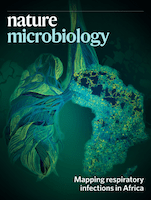
Nature Microbiology
Unveiling the Secrets of Microbial LifeNature Microbiology is a premier journal published by NATURE PORTFOLIO that has firmly established itself within the realms of microbiological research since its inception in 2016. Based in the United Kingdom, this prestigious journal specializes in the intricacies of applied microbiology, cell biology, genetics, immunology, and medical microbiology, making it a cornerstone for academics and professionals alike. With an impressive Scopus ranking placing it in the top tier across various relevant categories—such as rank #3 in Genetics and #2 in Applied Microbiology—it underscores the journal’s commitment to high-quality, impactful research. Although it operates under a subscription model, Nature Microbiology's broad Open Access policy facilitates greater dissemination and visibility for its authors. The journal's objectives are centered around publishing cutting-edge advancements that enhance our understanding of microbial life, its interactions, and applications in health and disease. As a Q1 journal across multiple disciplines, it holds immense significance for researchers, professionals, and students enthusiastic about the latest innovations and breakthroughs in microbiology.

ANAEROBE
Illuminating the Role of Anaerobes in Health and DiseaseANAEROBE is a highly regarded scholarly journal published by Elsevier Science Ltd, dedicated to advancing the study of anaerobic microorganisms and their roles in infectious diseases, microbiology, and various clinical applications. With an ISSN of 1075-9964 and an E-ISSN of 1095-8274, this journal has established itself as a pivotal resource for researchers and professionals interested in the unique aspects of anaerobic biology since its inception in 1995. Ranking in the Q2 category in both Infectious Diseases and Microbiology, it stands out for its commitment to publishing high-quality research that reflects the evolving complexities of microbial interactions in health and disease. Although the journal currently does not offer Open Access options, its impact is notable, with the 2023 Scopus rankings reflecting a practice of excellence—ranked #137/344 in Infectious Diseases and #96/182 in Microbiology. As a vital forum for scholarly exchange, ANAEROBE serves as an essential platform for scientists seeking to explore the depths of anaerobic studies, shaping future discoveries and clinical advancements.

JOURNAL OF MICROBIOLOGY
Advancing microbial science for a better tomorrow.JOURNAL OF MICROBIOLOGY, published by the Microbiological Society Korea, is a prestigious peer-reviewed journal dedicated to the advancement of knowledge in the fields of microbiology, applied microbiology, and biotechnology. Established in 1996, this journal serves as a vital platform for researchers and professionals from around the globe to disseminate their findings and engage in multidisciplinary discussions pertaining to microbial sciences. With an H-index that reflects its impact, the journal holds a commendable Q2 ranking in key categories including Applied Microbiology and Biotechnology, as well as Medicine (Miscellaneous), which underscores its significance in the academic community. Despite being a subscription-based journal, the JOURNAL OF MICROBIOLOGY aims to contribute to the understanding of microbial processes and their applications, facilitating advancements that are essential in health, industry, and environmental sciences. Researchers, students, and practitioners are encouraged to explore this rich resource for the latest research and trends in microbiology.

Microorganisms
Connecting global minds in microbial sciences.Microorganisms is a leading open-access journal published by MDPI based in Switzerland, catering specifically to the rapidly evolving fields of microbiology and virology. Since its inception in 2013, the journal aims to foster the dissemination of high-quality research through its comprehensive and interdisciplinary platform, with a particular focus on both fundamental and applied microbiological sciences. Contributing to its esteemed reputation, Microorganisms holds a commendable Q2 ranking in the categories of Microbiology and Virology, as well as in Medical Microbiology, highlighting its significance in the academic community. With a consistent impact, evidenced by its rankings in Scopus—such as rank #25 in Virology and #56 in Microbiology—the journal serves as an invaluable resource for researchers, professionals, and students looking to stay at the forefront of microbiological research. As an open-access journal, Microorganisms ensures that vital research findings are readily available to a global audience, promoting collaboration and innovation in the study of microbial life and its implications for health and disease.

MICROBIOLOGY
Bridging Research and Biotechnology BreakthroughsMICROBIOLOGY (ISSN: 0026-2617, E-ISSN: 1608-3237), published by MAIK NAUKA/INTERPERIODICA/SPRINGER, is a pivotal journal in the field of microbiological research, operating from the vibrant hub of New York, United States. With a focus on the intricate relationships and functionalities of microorganisms, MICROBIOLOGY serves as an essential resource for professionals and researchers dedicated to advancing the knowledge of applied microbiology and biotechnology. As of 2023, it holds a competitive Q3 and Q4 category ranking in Applied Microbiology and Biotechnology and Microbiology, respectively, reflecting its commitment to high-quality and impactful research. Although currently not open access, the journal extends comprehensive insights into critical topics that span environmental microbiology, clinical applications, and biotechnology advancements, making it a vital platform for disseminating innovative findings in this ever-evolving discipline. Researchers and students alike will find MICROBIOLOGY to be an invaluable addition to their academic and professional repertoire.
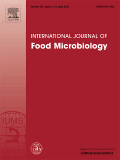
INTERNATIONAL JOURNAL OF FOOD MICROBIOLOGY
Leading Research for a Healthier Food FutureINTERNATIONAL JOURNAL OF FOOD MICROBIOLOGY is a leading journal in the field of food safety and microbiology, published by Elsevier. With an impressive impact factor and a distinguished position, it ranks in the top quartile for both Food Science and Medicine, as well as holding a strong presence in Microbiology and Safety, Risk, Reliability, and Quality categories. The journal provides a vital platform for researchers, professionals, and students to disseminate and discuss innovative research findings and applications that address the complexities of food microbiology. Operating from its headquarters in the Netherlands, this journal not only facilitates access to high-quality scholarly articles but also encourages the development of interdisciplinary approaches to tackle current challenges in food safety and public health. Since its inception in 1984, the journal has continually evolved, ensuring that it remains at the forefront of scientific inquiry, making it a crucial resource for anyone engaged in the food sciences.
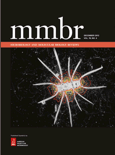
MICROBIOLOGY AND MOLECULAR BIOLOGY REVIEWS
Unraveling Complexities in Microbiology and Molecular BiologyMICROBIOLOGY AND MOLECULAR BIOLOGY REVIEWS, published by the American Society for Microbiology, is a premier journal dedicated to advancing the fields of microbiology and molecular biology. With an impressive impact factor reflective of its Q1 ranking in categories such as Immunology, Infectious Diseases, and Molecular Biology, this journal consistently showcases high-quality, peer-reviewed articles that contribute to the current understanding of microbial life and molecular mechanisms. Operating since 1997, the journal aims to bridge the gap between microbiological methods and molecular biology applications, making it an essential resource for researchers, professionals, and students alike. Readers can access content through various platforms, ensuring that the latest findings are readily available to the scientific community. With its esteemed reputation, MICROBIOLOGY AND MOLECULAR BIOLOGY REVIEWS remains a leading voice in the exploration of the life sciences, catering to a broad audience deeply invested in unraveling the complexities of microbial and molecular systems.
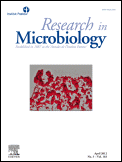
RESEARCH IN MICROBIOLOGY
Advancing the frontiers of microbiological research.Research in Microbiology, published by Elsevier, is a prominent academic journal devoted to advancing the field of microbiology, encompassing a diverse array of topics including immunology, molecular biology, and biochemistry. Established in 1987, the journal has expanded its focus over the years, with a commendable impact factor reflecting its relevance and influence in the scientific community. Although it does not currently offer open access options, Research in Microbiology remains a crucial resource for researchers and professionals seeking to stay abreast of the latest findings and methodologies. The journal holds a respectable Q2 ranking in Medicine (miscellaneous) and a Q3 ranking in both Microbiology and Molecular Biology for 2023, highlighting its position within the scholarly landscape. With its base in France and accessible to a global audience, Research in Microbiology continues to foster scholarly exchange, making it an essential platform for the dissemination of impactful microbiological research.
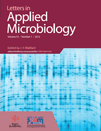
LETTERS IN APPLIED MICROBIOLOGY
Innovating Insights in Applied MicrobiologyLETTERS IN APPLIED MICROBIOLOGY, published by OXFORD UNIVERSITY PRESS, is a prominent journal in the field of applied microbiology, serving as an essential platform for researchers and professionals to disseminate innovative findings. With an ISSN of 0266-8254 and an E-ISSN of 1472-765X, this peer-reviewed journal has been contributing to the scientific community since 1985 and continues to engage with cutting-edge research through 2024. With its current Scopus ranking placing it in the 45th percentile of its category, specifically at rank #70 out of 127 in the Applied Microbiology and Biotechnology field, it underscores its significance in advancing knowledge and applications pertinent to microbial science. Although it is not open access, LETTERS IN APPLIED MICROBIOLOGY offers comprehensive insights aimed at enhancing the understanding of microbiological phenomena in practical scenarios, making it a valuable resource for both seasoned experts and emerging scholars.

ARCHIVES OF MICROBIOLOGY
Bridging Disciplines, Inspiring DiscoveriesThe Archives of Microbiology, published by Springer, is a reputable journal in the field of microbiology, serving as a vital platform for the dissemination of groundbreaking research and critical reviews since its inception in 1974. With an ISSN of 0302-8933 and an E-ISSN of 1432-072X, this journal operates out of Germany and maintains a global reach, promoting high-quality scholarship across multiple disciplines, including biochemistry, genetics, and molecular biology, as evidenced by its Q2 ranking in Medicine (miscellaneous) and consistent Q3 placements in other categories in 2023. Although the journal does not offer open access options, its rigorous peer-review process ensures that published articles are of the highest standard, making it an essential resource for researchers, professionals, and students keen on advancing their understanding of microbial sciences. As the journal converges toward 2024, it remains committed to fostering innovative microbiological research and facilitating interdisciplinary dialogue within the scientific community.